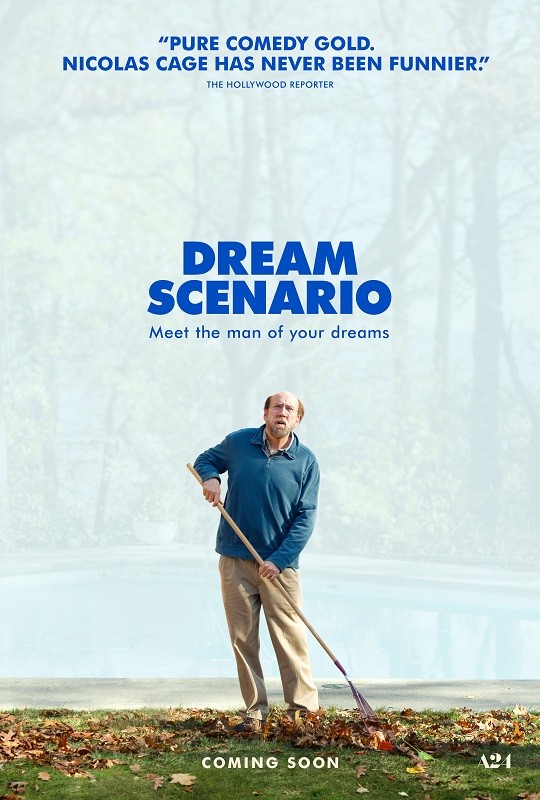Dream Scenario
Introduction
Onto the next MAMI release and I finished watching the English film Dream Scenario starring Nicholas Cage. And it won’t be wrong if I say that Dream Scenario was one of the most anticipated films of the Mumbai Film Festival. One reason for the same was that the film was tauted to be another chaotic mindfuck backed by producer Ari Aster who had previousky directed films like Hereditary and Beau Is Afraid. The absurdist comedy genre is itself a huge challenge given that it caters to only a slender section of the audience who resonate with the sense of humour of the final product. Previously, a film like Beau Is Afraid was met with extreme reactions precisely for this reason, wherein many people did watch the film out of curiosity but the opinions were divided. One way of enjoying an absurdist comedy is to surrender to the vision of the makers completely without questioning the logic behind the proceedings. There is most definitely an underlying message being conveyed that needs to be consumed amidst the layer of chaos. And with Dream Scenario, I was quite excited to witness the film given its wacky premise. So then does Dream Scenario manage to impress, let’s find out.
Story & Screenplay
Dream Scenario follows the story of a regular unattractive man who suddenly becomes a sensation after he starts appearing in the dreams of strangers around him. The story is a quirky comedy which acts as a satire on the cancel culture which is prevalent on social media. We have seen instances wherein there are random people who become overnight stars, only to later decline into oblivion. It is just 15 minutes of fame that is being catered to in our generation that has an incredibly short attention span. And the story caters to all of these points in an incredibly wacky narrative. The screenplay standing at a timid length of just 102 minutes is taut and very playful with its narrative style while tactfully touching upon some crucial aspects of social media in a rather quirky manner.
The drama begins with a sequence featuring the protagonist and his daughter who are suddenly attacked while having a quiet time at their home. Soon you get to know that the sequence was indeed a dream of the protagonist’s daughter, and this very sequence gives a little sign of the things to follow in the drama. You soon get to know that the protagonist is an average Joe, a college professor who wishes to publish his book on plants. This, until the unthinkable happens! He gets featured as a by-stander in the dreams of several unknown people, thus making him a household sensation.
The proceedings are quirky and the antics of the protagonist will often tickle your funny bone. The events of the film do have an engrained humour to it while also being satirical in its approach. The parallels of the turn of events can be drawn to the social media sensations that garner a lot of fame suddenly out of nowhere. The idea of being famous does have its perks and this aspect is hilariously showcased in the film with regard to an agency who wish to cash in on the popularity of the protagonist while an employee wishes to enact her love making dream sequence in real life with the protagonist. But as they say, a rise is always followed by a fall which holds true here as well. This is when the writers introduce the horror element of the protagonist shown to be brutally butchering people in their dreams, that not only intimidates people in real lives but also results in the protagonist being bullied and distanced himself from the society.
The final act is pretty interesting wherein the writers introduce a sort of a technology wherein developers can enter the dreams of random people, thus building a dream scenario of sorts. This was a direct jibe taken at the cancel culture in a generation where blue ticks rule the roost while completely ruling out the urge to meet and interact with everyone in person. This was a palatable idea in the age of virtual reality wherein mental health and loneliness would consistentky remain by-products of the world. Overall, the screenplay is really well written and it makes for a supremely enjoyable watch.
Dialogues, Music & Direction
The dialogues are quirky and quite sharp with the satire while accomodating the antics of the characters really well. The music and the BGM blend perfectly with the drama. The cinematography captures the two extremes of the absurdist comedy and horror genre perfectly with some hilariously tertifying frames. The editing is sharp and crisp. Director Kristoffer Borgli hits the ball out of the park here and how! He balances the quirky humour in the drama perfectly while creating a world which was quite believable despite the far-fetched idea on paper. And to weave a satire which is relevant and something which would stay relevant in times to come, was the icing on the cake. The direction is top notch here.
Performances
The performances are good here. Dylan Gelula as Molly is incredibly good with subtle streaks of humour in her performance. Julianne Nicholson as Janet has her moments to shine. All the others do a good job as well but let’s not fool ourselves. This was an out and out Nicholas Cage show in a performance of a lifetime. As Paul, he seamlessly adds bouts of humour to his character which seemed so effortless. His body language and mannerisms were absolutely on point and needless to say that his screen presence was terrific as well. This was an acting masterclass which should fetch him an Oscar nomination this year for sure!
Conclusion
As a part of our MAMI coverage, Dream Scenario is a brilliant absurdist horror comedy on the cancel-culture of the social media generation that comes with my highest recommendation. Do not miss this at MAMI!




